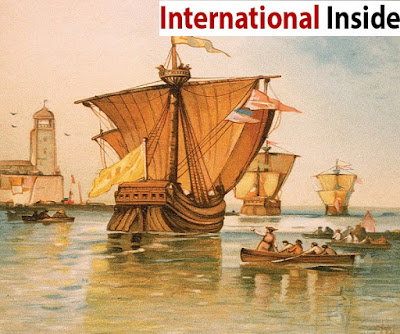The Mysterious Origins of Christopher Columbus
For someone as famous (or infamous, depending on your view of history) as Christopher Columbus, you might think that we know all there is to know about his life. After all, researchers have been fascinated in his story ever since he “discovered” the Americas. But there is much about the man that has not been proven and so historians cannot definitively give you an answer about every detail. In fact, the earliest details of his life are some of the least understood, starting with where he was born.
There are theories that connect him to a variety of regions, countries, and religions at birth. 500 years after he began crossing the Atlantic, we still don’t know which are true.
Traditionally, Columbus has been thought to be Italian. His birth name was allegedly Cristoforo Colombo. For people who subscribe to this theory, he was born in 1451 to Susanna Fontanarossa and Domenico Colombo who sold wool. They lived in the region of Liguria which was part of Northwest Italy. The capital of Liguria was Genoa at that time. Genoa was its own city-state (Italy wouldn’t exist as the unified country we know until 1861) and was very wealthy and influential.
If Columbus truly did spend his childhood in Genoa, then his father’s work in a city with trade connections in other countries, including Spain, would have afforded the young Columbus the opportunity to learn many languages. There are accounts, including some by his son, that talk about how Columbus left Genoa in his teens to work for the Portuguese merchant marines. The experience he gained while traveling as far as West Africa, Ireland and Iceland would be invaluable to his later explorations.
While in Portugal, Columbus married a Portuguese woman and began petitioning the Portuguese government to fund his Atlantic excursion. After they refused, he moved to Spain in 1485 where he began lobbying the monarchy of Spain to back his trip. They finally relented in 1492.
Columbus’s own writings support this theory, including his will where he describes himself as being from Genoa. But there is little other evidence to support this claim. The Genoese ambassadors to Spain did not claim him as their own, even after his successful voyages. Also, official Spanish documents do not note Columbus as a foreigner like they do for other non-Spanish explorers of the day.
In 2012, Fernando Branco published a book that presented his theory that Columbus was born in Portugal and not Genoa. He believes that Columbus’ real name is Pedro Ataíde. It is believed that Ataíde was killed in a naval battle in 1476. Branco and some other Portuguese historians believe that he actually survived, changed his name and continued living under a new identity.
Researchers are testing this theory. In 2018, they began comparing the authenticated DNA of Fernando Columbus, Christopher Columbus’s son, with the DNA of Antonio, Ataíde’s cousin. A genetic match should be convincing evidence of whether Columbus was Portuguese.
In 2009, another researcher, Estelle Irizarry, published her own book which shows the results of analyzing Columbus’s writings in hundreds of documents. Her research suggests that Columbus was born in Aragon in the northern part of Spain. She found that the primary language used by Columbus was Castilian. There are no documents existing where Columbus uses Ligurian.
Her theory is that Columbus was actually Jewish and was hiding his ancestry to avoid persecution by the Christian church in Spain. There are many instances of Jewish phrases in his writings.
There are wilder theories that Columbus was Polish or Scottish, but there is little evidence to support these theories.
Surprisingly, for all that is known about Columbus and his voyages, we still don’t know for certain where he actually came from.




Comments
Post a Comment